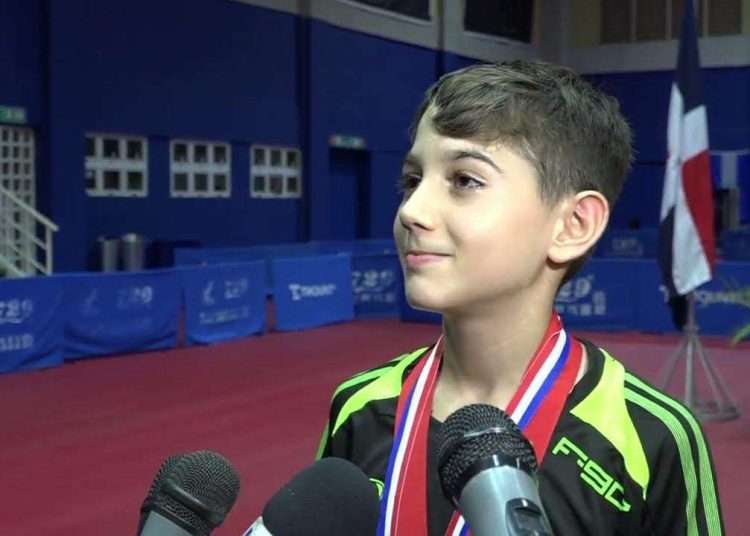By Fabio M. Quintero
Andy wanted to name the game after him. In the final match of the day, he was down two sets against the British Kacper Piwowar. He had previously lost the first four duels of the group by sweep. The table was near the stands. Then, Raúl Piedra, a friend of his father’s, tells him: “Calm down, you’re hungry and when you’re done, we’ll go to a McDonald’s.”
“No, what I have is a thirst for victory,” he replied.
Andy Maqueira came in and drank the British to the last point:
What’s left is the backhand serve, and the rival attacks forehand. He defends to the center and is again bombarded to the left. He responds to Kacper’s right hand, which now cannot hit him hard and throws it into the middle. Andy counters with a backhand to the right, but his opponent does shoot hard up the middle. The Cuban throws it the other way around. The European hits back. They exchange attacks until Maqueira settles to his right and the complete discharge on the left of the opponent. The British contender can only touch the ball.
Andy puts the racket on the table and runs to where his coach is. He jumps and screams. He turns to the stands and still screaming, flexes his feet and throws his hand into the air with a clenched fist, as if he were celebrating a goal and the World Cup final was being played in Nantes.
He is at the 2023 World Hopes Week and Challenge Hannebont, in France, the World Table Tennis Championships for children up to 13 years old. There he defeated one who was 14, who was allowed to compete due to the delay caused by the pandemic and who had just been the holder of the wicontender prior to the event.
He was a month away from turning 12. He was in the tournament for having won the Pan American championship in his category in September (the first Cuban to do so). The fifteen best players in the world went to France, plus the champions of the five continents of the lower age.
Despite the biological and training disadvantage, Andy wanted to reach 10th or 5th place, and before leaving for Europe he dreamed of winning. But being the 15th on the planet is not bad at all.
A raffle divided the athletes into two groups of ten. Red team and blue team. Andy picked the red; although he always dresses in the other color with a headband. The first six advanced to meet those of the other group, so even though he had a bad first day, he was still able to recover on the second.
“After that first day, I felt like I could beat anyone playing against me. I felt so excited and said: ‘Hell, I have to start playing now, because since I had won I felt prepared, but the next day I started losing 3-0 against everyone in my group.’
“In the consolation round I then beat the Filipino (Khevine Kheith Cruz) and then I lost against the Belgian (Matt Closset), who I don’t know why was the easiest. I lost because he was serving long and I had to serve him short. The ball you see outside the table is a plate. I won’t lie to you, I expected something better, I didn’t like that 15th very much. I wasn’t playing like I did in Cuba or the Dominican Republic.”
“Because?”
“I don’t know…. I felt it.”
“Isn’t it because the rivals were stronger?”
“I don’t think so, because here I play with the greats who have a higher level and I beat them and…the place I expected to take was 10th or 5th, because 1, 2 and 3 were very hard. It’s not that I have low self-esteem; the thing is that these children have been playing table tennis all their lives.”
Andy Maqueira has only been playing table tennis for two years. Before he played soccer. He says that that is his other life. He was a forward and he was the best in Bejucal, his town. The coach still asks him to come back; but he only kicks a ball at school or in the park near his house.
He started playing table tennis in a hotel when he finished second in a championship that was organized. He was defeated by an Argentine tourist, and since he doesn’t like to lose even on vacation, he asked his father for a coach.
Alexander Maqueira spoke with Edenio Rodríguez, the experienced Bejucal coach who has trained multiple national champions in lower categories. At first, he was reticent because of Andy’s age and promised to have him for a few months as a trial.
“Andy started at a late age. The ideal in the country is around 5 years. Preschool, first grade. He was 10; but with rapid growth and very positive progress, and he took quick steps to join the team,” says Rodríguez.
His first contest was the National Championship in Villa Clara, on July 22 of last year. They expected a favorable result because during the preparation games he had shown development; but no one counted on him taking first place. In the center of the country, he debuted against what was Cuba’s number 1 table tennis player at the time, a local Andy did not lose a single set. He would not give up any in the whole contest. And that result gave him the Pan American qualification.
In the continental championship in September, he was a surprise. “Big surprise,” says Edenio, “because there was a high level and he was able to come out very well. He entered the single elimination phase and didn’t lose. It was not easy, because all the matches were divided.”
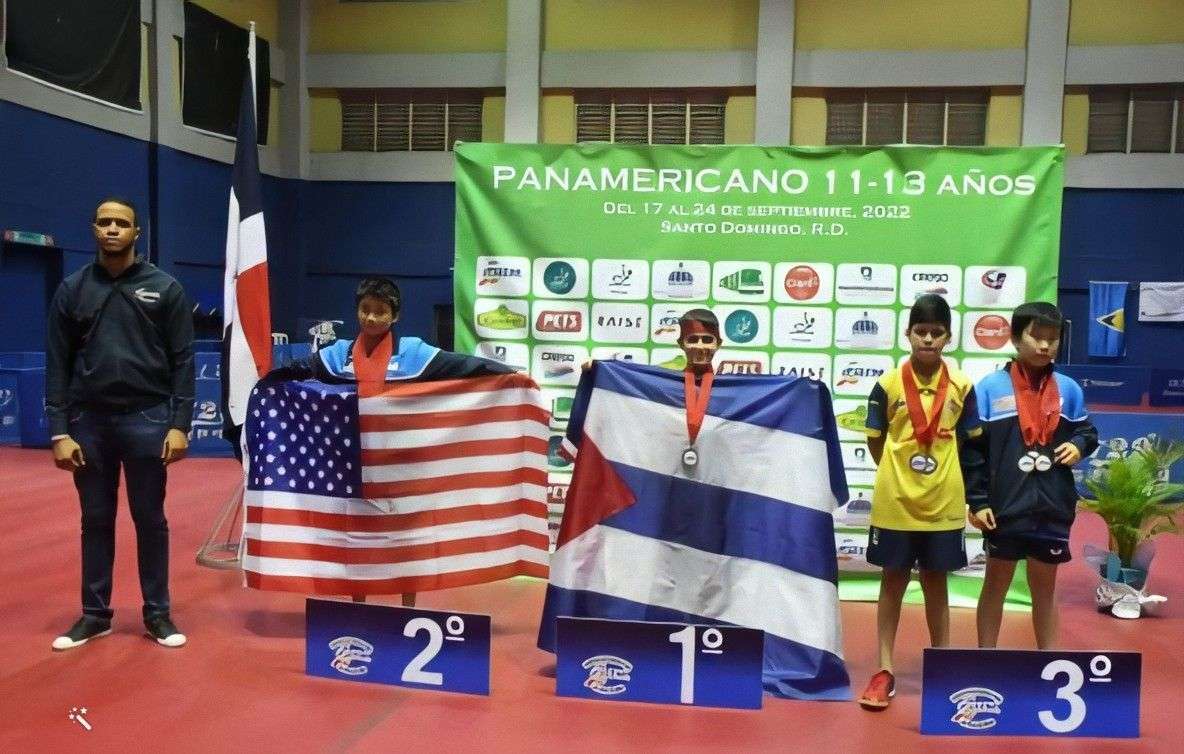
“The key to the result is the development in terms of service and rotation. These are two things that set him apart from the rest of the players and make him difficult for his opponent to control. There is a difference compared to the other children of his age,” the coach explains.
His battle against the first two players from the United States and Brazil were on the cover of Cuba and the International Federation of the discipline, as was his spectacular celebration, raising his hand in the air with a clenched fist.
Andy, in six months, went from nothing to the top talent in the country. He went from playing a national in Santa Clara to a World Cup in Nantes. From being Andy to being the Genius. From not knowing the competition to not knowing defeat. More than steps, giant impulses with the hand every time he takes the ball out to serve. Higher and higher, until touching the roof of the premises where he trains.
For Helen Campos, the main thing in her son’s game is the faith that he puts into it, a faith that moves mountains, which tilts the table and creates a precipice on the rival’s side. The faith that Helen believes that in France he lacked due to lack of concentration and frustration.
For her as for Alexander, his father, it seems like six years have gone by and not just six months. For all three of them, the result in the World Cup has been hard, even if the coach is satisfied:
“Andy shows up a year younger than most of the contestants and he was overwhelmed by those conditions. The high level and biological condition. There is no coincidence, nor can we say that his place is unrequited compared to the rest of the athletes. What caught my attention the most is the players’ sporting mastery and level of anticipation.”
“In addition, the conditions are mostly not gained in daily training, it has to do with the number of events where they compete annually. They see each other constantly. To reach that level you have to compete. They received the serve well; it didn’t make a difference.”
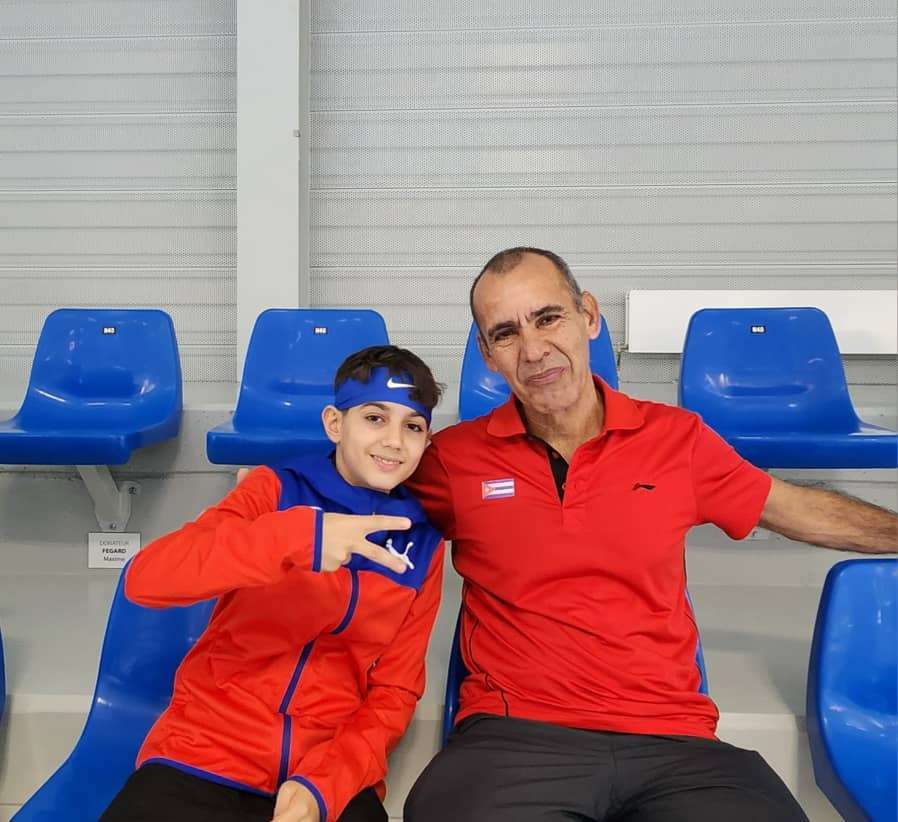
“He did quite well psychologically; he played quite at his level. Several aspects made him not get the victory. We have to train better, try to play with the best teams the country has in open tournaments. Continue training with the national team. That would make it easier for us,” concludes the coach.
For Alexander Maqueira, it was hard to watch him lose. When they arrived at the facility, Edenio confessed that the level was very high and that the forecast would indeed be between 15 and 20.
“A ladder system was made, which is where the parameters are measured: the child was lousy on the first day, lousy on the second day, and super good on the third day. The ladder is made to measure the level of the players: there are ten tables. You start at a table and the one who loses goes down and the one who wins goes up. If the player stays in the middle, he’s going to have good results. If you see a guy come up and stays at the first table, that’s a monster. When we went to the Pan American tournament the commissioner explained that to me. Andy started at table 7 and ended up at table 5. So he had gone up,” Alexander explains.
“On the second day of the group stage, the Bulgarian had it 2-0 (11-6 and 11-4). The kid stood in the corner, began to cry, entered and beat him. Unbelievably, as mine had done the day before. And then he loses to the Belgian, with whom he had lost 3-2 in groups. He was already there in competition. Out of the game It was not a good tournament despite the fact that everything has an impact. He could have done more,” he regrets.
Andy is perhaps short for his age, and skinny, very skinny at an age where a year makes a lot of difference. In France he had trouble sleeping well during the contest. And he had to make his debut against the Colombian Emanuel Otalvaro, his roommate and bitter rival from the area, who is a year ahead of him. That initial defeat affected him psychologically.
A week after the tournament, at home, he would tell me what it cost him to win two games. He had to give it all.
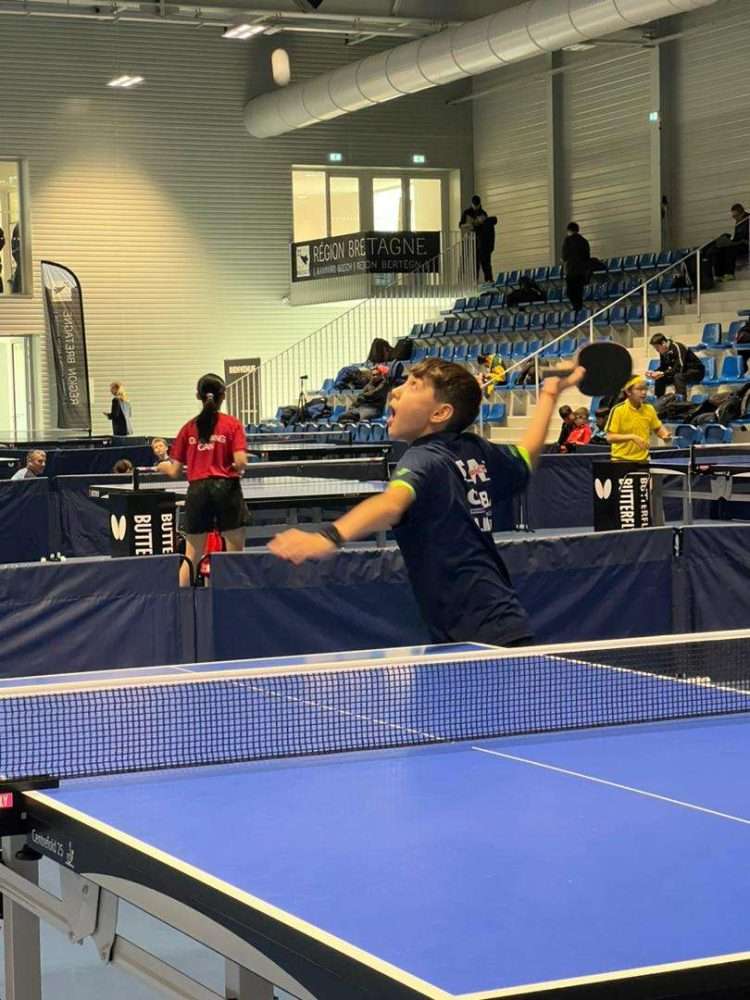
“When I walked through that door to train and play games I said: ‘This is a high level.’ I had never seen it. I felt confident and tried to do my best to face the tournament. But they were the top twenty talents in the world, that wasn’t a piece of cake. It was not going to be easy,” he admits.
“They hit the ball more than me, they shot more upside than me, because they hit the ball very hard. I didn’t see the ball. You don’t know where they throw the ball; they move you a lot. When they take the initiative, sometimes they never fail.”
Andy affirms that he played “only with the Italian, who was the champion; on the ladder and the sets were hard fought. These people are always at training bases, never in their country, always on a plane. They play a lot. It’s píkiti-pácata, píkiti-pácata. They are already adapted to playing two or three times with another opponent. Competitions where the best go. They had an idea of how each one shoots more or less, how they play. Not me, I arrived without knowing. I had no strategy; I was creating it in the game. But a lot of level.”
Although Edenio told him over and over again to have fun, Andy was only able to do it in training, because afterwards it meant “losing a lot.” He expected something good, but it wasn’t so. However, he met people, a new training area, the cold, the heating, the French team.
“Now I have to try harder and try to do things that the kids did there, like improve my attack and counterattack. I’m fine. And, normal, to continue preparing myself so that more victories come, and they are not defeats. That psychologically helps, train hard, try to give 100%, not talk with your teammates.”
On Thursdays, he goes to Cerro Pelado to meet the women’s national team. He has played against everyone. He says that the ones he has seen all play well. He doesn’t have any favorites. On a world level, the Japanese Harimoto Tomokazu is his favorite. “He beat the best and the second best in the world. My style of play is aggressive, just like his.”
“Do you like being like that?”
“Of course, you come to a game to give everything. You do not come to play like a under 7. With aggressiveness on the table: fua, fua, fua.”
“In the video of the Pan American tournament when you won you went crazy….”
“Pffff… (silence). The emotion was so great that I did not sleep that day. I wanted to get into the hotel pool. I was going to get in, but they wouldn’t let me because there was a lot of chlorine. Then it was an interview here, an interview there. I appeared more on the news.”
Now he wants to train more. “The advice that they gave me in France is that when you are training you have to train because if you are going to do something badly, to laugh, to have fun, don’t train. A lot of discipline in training.”
“Are you having fun in training?”
“Nah….”
(His mother buts in and says that he “enjoys” it).
“What do you do?”
“I’m the one who yells the most there; I’m a clown.
“Do you like to yell during the game, too?”
“Of course; the other players too. They go with fighting spirit.”
Training begins at 2:00 p.m., Monday through Friday, and ends at 6:10 or 6:15. They are in a premise that belongs to INDER, one block from Plaza Juan Delgado in Bejucal.
Andy comes running and passes in front of the gate that opens the area. He goes around the block and goes to buy an ice cream cone. He does it every day at 1:57 or 1:58 p.m.

They do a warm-up lap around the place before they start. The children take the opportunity to play tag. He is wearing a PSG t-shirt. They compete with Jan Carlos, their partner, to see who can jump the most and touch the poster hanging almost in the middle of the premises.
A poster in which the two of them appear together with Emily and Osmary and Edenio, with their gold medals around their necks from the last national championship. But now the champion will be the one who jumps the highest.
About twelve boys and girls train here. Those who stand out the most, in addition to Andy, are Emily Domínguez and Osmary Álvarez: “They are both national champions, multi-medalists. They have a very strong level and could represent us very well at an international event. If the economic conditions existed, they could have traveled. For the time being there is no way. The country does not provide funding for the Pan American events of each category,” argues the professor.
Each one goes to his position for the attack and counterattack movements, forehand and backhand. Andy with Jan Carlos and Emily with Osmary. First without the ball in two turns. Andy at each break takes the opportunity to jump or pass his hand over the table. He is hyperactive. He is easily distracted. Then they execute serve, attack and return, a hundred times forehand and backhand. Serves with effect, without effect, short, long.
Andy every so often asks the girls how many they’ve done. He counts badly, cheats to finish first, takes advantage and then shows off. The girls tell the coach. They are more responsible; they do the exercise as it is. Andy and Jan Carlos sometimes play around.
Then he junps over the wooden fences that separate the taraflex from the picnic area. In the championship last July in Santa Clara, Mayabeque swept thanks to the children of Bejucal. Osmary, in addition to winning her division, was silver in the superior; she was second only to her compatriot Emily in a hard-fought match.
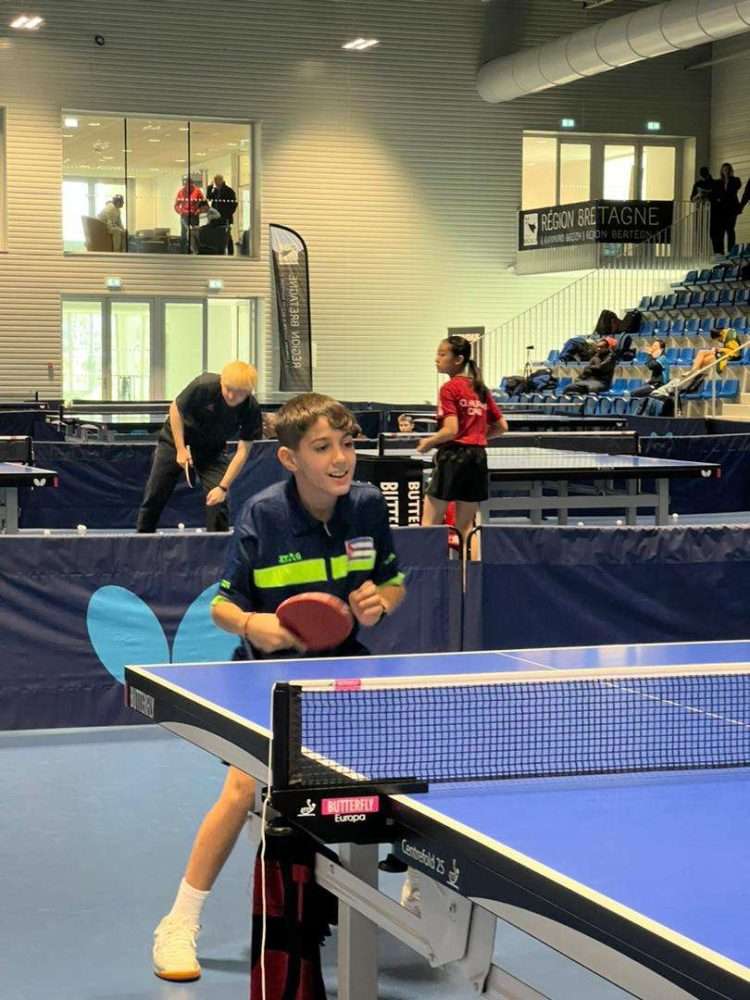
In the first game of the afternoon, Andy is up against Osmary. He gives her 4 points advantage. He yells “let’s go” to start the first set. When he loses, he complains about the racket and Edenio replies that the most important thing is what’s behind it. He wets it and wants to dry it with the coach’s t-shirt. Edenio acts strongly because Andy is very naughty, a prankster. He can drive anyone crazy.
Andy and Emily’s rivalry is very tough. They are already a 13-year-old category and the favorites in the next National. Edenio explains that Emily is very combative, she has good anticipation, and she is always where she needs to be. In an Open she beat a high level 15 player. Andy has won a few matches against her.
Against Emily, Andy screams with every point he gets. He says that he yells the same as in a competition because in the end in training you have to do the same as in the real game. It bothers Emily a lot. He gets frustrated every time she loses a point and her teammate and opponent again celebrates.
Rodríguez explains that the Federation has well defined the dimension of the celebrations of the points. Andy with his celebrations almost reaches the regulated limit. So far, he is not psychologically affected by the result at Hope in France. He feels that he is motivated as always.
I ask him if we are in the presence of an exceptional talent, and he answers that there are certain characteristics that make him different and that perhaps he has a different future from other children.
“You see different conditions. The experts use words like that it is ‘a child with good hands’; it is a child who feels the ball, from working in a different rotation. The What’s missing is the determination that he may have.”
Emily thinks that Andy loves to show off. His disinhibition is total. His daring. At school he sings whenever he can. He wants to be the best at what he sets out to do, he wants to prove it. His fundamental weapon? Believing it.
This year he will return to the national championship with aspirations to compete next at the continental Hope in September: America’s Top Twenty. From there, the two finalists would qualify for the next World Hope; the tournament in which he just shook hands with defeat in the sport.
Andy Maqueira at a tennis table yells victory until he is hoarse so as not to hear the whisper of defeat.
“Do you like to be called a genius?”
“I don’t care….” (he winks). “But it’s my middle name….”

